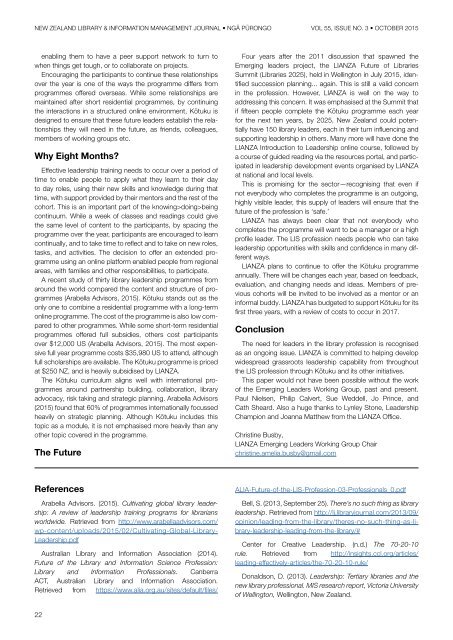THE NEW ZEALAND LIBRARY & INFORMATION MANAGEMENT JOURNAL NGĀ PŪRONGO
NZLIMJ%20Vol%2055%20Issue%203
NZLIMJ%20Vol%2055%20Issue%203
Create successful ePaper yourself
Turn your PDF publications into a flip-book with our unique Google optimized e-Paper software.
<strong>NEW</strong> <strong>ZEALAND</strong> <strong>LIBRARY</strong> & <strong>INFORMATION</strong> <strong>MANAGEMENT</strong> <strong>JOURNAL</strong> • <strong>NGĀ</strong> <strong>PŪRONGO</strong> VOL 55, ISSUE NO. 3 • OCTOBER 2015<br />
enabling them to have a peer support network to turn to<br />
when things get tough, or to collaborate on projects.<br />
Encouraging the participants to continue these relationships<br />
over the year is one of the ways the programme differs from<br />
programmes offered overseas. While some relationships are<br />
maintained after short residential programmes, by continuing<br />
the interactions in a structured online environment, Kōtuku is<br />
designed to ensure that these future leaders establish the relationships<br />
they will need in the future, as friends, colleagues,<br />
members of working groups etc.<br />
Why Eight Months?<br />
Effective leadership training needs to occur over a period of<br />
time to enable people to apply what they learn to their day<br />
to day roles, using their new skills and knowledge during that<br />
time, with support provided by their mentors and the rest of the<br />
cohort. This is an important part of the knowing>doing>being<br />
continuum. While a week of classes and readings could give<br />
the same level of content to the participants, by spacing the<br />
programme over the year, participants are encouraged to learn<br />
continually, and to take time to reflect and to take on new roles,<br />
tasks, and activities. The decision to offer an extended programme<br />
using an online platform enabled people from regional<br />
areas, with families and other responsibilities, to participate.<br />
A recent study of thirty library leadership programmes from<br />
around the world compared the content and structure of programmes<br />
(Arabella Advisors, 2015). Kōtuku stands out as the<br />
only one to combine a residential programme with a long-term<br />
online programme. The cost of the programme is also low compared<br />
to other programmes. While some short-term residential<br />
programmes offered full subsidies, others cost participants<br />
over $12,000 US (Arabella Advisors, 2015). The most expensive<br />
full year programme costs $35,980 US to attend, although<br />
full scholarships are available. The Kōtuku programme is priced<br />
at $250 NZ, and is heavily subsidised by LIANZA.<br />
The Kōtuku curriculum aligns well with international programmes<br />
around partnership building, collaboration, library<br />
advocacy, risk taking and strategic planning. Arabella Advisors<br />
(2015) found that 60% of programmes internationally focussed<br />
heavily on strategic planning. Although Kōtuku includes this<br />
topic as a module, it is not emphasised more heavily than any<br />
other topic covered in the programme.<br />
The Future<br />
Four years after the 2011 discussion that spawned the<br />
Emerging leaders project, the LIANZA Future of Libraries<br />
Summit (Libraries 2025), held in Wellington in July 2015, identified<br />
succession planning... again. This is still a valid concern<br />
in the profession. However, LIANZA is well on the way to<br />
addressing this concern. It was emphasised at the Summit that<br />
if fifteen people complete the Kōtuku programme each year<br />
for the next ten years, by 2025, New Zealand could potentially<br />
have 150 library leaders, each in their turn influencing and<br />
supporting leadership in others. Many more will have done the<br />
LIANZA Introduction to Leadership online course, followed by<br />
a course of guided reading via the resources portal, and participated<br />
in leadership development events organised by LIANZA<br />
at national and local levels.<br />
This is promising for the sector—recognising that even if<br />
not everybody who completes the programme is an outgoing,<br />
highly visible leader, this supply of leaders will ensure that the<br />
future of the profession is ‘safe.’<br />
LIANZA has always been clear that not everybody who<br />
completes the programme will want to be a manager or a high<br />
profile leader. The LIS profession needs people who can take<br />
leadership opportunities with skills and confidence in many different<br />
ways.<br />
LIANZA plans to continue to offer the Kōtuku programme<br />
annually. There will be changes each year, based on feedback,<br />
evaluation, and changing needs and ideas. Members of previous<br />
cohorts will be invited to be involved as a mentor or an<br />
informal buddy. LIANZA has budgeted to support Kōtuku for its<br />
first three years, with a review of costs to occur in 2017.<br />
Conclusion<br />
The need for leaders in the library profession is recognised<br />
as an ongoing issue. LIANZA is committed to helping develop<br />
widespread grassroots leadership capability from throughout<br />
the LIS profession through Kōtuku and its other initiatives.<br />
This paper would not have been possible without the work<br />
of the Emerging Leaders Working Group, past and present.<br />
Paul Nielsen, Philip Calvert, Sue Weddell, Jo Prince, and<br />
Cath Sheard. Also a huge thanks to Lynley Stone, Leadership<br />
Champion and Joanna Matthew from the LIANZA Office.<br />
Christine Busby,<br />
LIANZA Emerging Leaders Working Group Chair<br />
christine.amelia.busby@gmail.com<br />
References<br />
Arabella Advisors. (2015). Cultivating global library leadership:<br />
A review of leadership training programs for librarians<br />
worldwide. Retrieved from http://www.arabellaadvisors.com/<br />
wp-content/uploads/2015/02/Cultivating-Global-Library-<br />
Leadership.pdf<br />
Australian Library and Information Association (2014).<br />
Future of the Library and Information Science Profession:<br />
Library and Information Professionals. Canberra<br />
ACT, Australian Library and Information Association.<br />
Retrieved from https://www.alia.org.au/sites/default/files/<br />
ALIA-Future-of-the-LIS-Profession-03-Professionals_0.pdf<br />
Bell, S. (2013, September 25). There’s no such thing as library<br />
leadership. Retrieved from http://lj.libraryjournal.com/2013/09/<br />
opinion/leading-from-the-library/theres-no-such-thing-as-library-leadership-leading-from-the-library/#<br />
Center for Creative Leadership. (n.d.) The 70-20-10<br />
rule. Retrieved from http://insights.ccl.org/articles/<br />
leading-effectively-articles/the-70-20-10-rule/<br />
Donaldson, D. (2013). Leadership: Tertiary libraries and the<br />
new library professional. MIS research report, Victoria University<br />
of Wellington, Wellington, New Zealand.<br />
22


